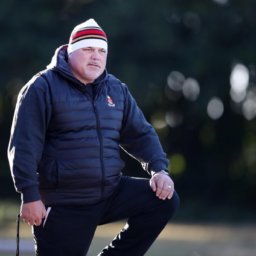South Africa’s top swimmers are in desperate need to get back into the water so they can resume their training for next year’s Olympic Games.
The past eight weeks of dryland training is starting to take its toll. The University of Pretoria’s Kaylene Corbett, who had qualified in the 200m breaststroke for the Tokyo Olympics, has injured her hips as well as knees.
Rocco Meiring (TuksSwimming head coach) is also beginning to worry as to how he is going to keep Tatjana Schoenmaker motivated if she is not allowed back in the pool to train soon.
Schoenmaker, who announced her arrival on the international stage at the 2018 Comonwealth Games, was regarded as a strong medal candidate for Team SA at the Tokyo Games, in both the 100 and 200 metres. Especially so after winning a silver medal in the 200m breaststroke at last year’s World Championships.
‘Since 2017 the most extended break Tatjana ever took from training was 14 days. It has now been 56 days in which I could not really coach her. You don’t need to be a rocket scientist to realise it is going to have a severe impact on her performance. I don’t even want to contemplate what will happen if another four to six weeks elapse before she is allowed to swim,’ coach Meiring explained.
The Tuks coach emphasised that he fully understood the necessity for a national lockdown in the beginning phase of the pandemic. After all, people’s lives do matter. According to him, however, there comes a time when reality should be faced.
‘Swimmers are the only athletes who can’t train on land. It took Kaylene Corbett two years of huge sacrifices and long hard hours in the pool to qualify for the Tokyo Olympics. After she had done, so she was super motivated to be at her best. It is that dedication that led to her getting injured. When the lockdown started, she continued to give 100 percent when training. But it was on land. She ended up paying for it.
‘It is going to take time for her to fully recover and regain confidence in her body’s abilities. The reality is that no breaststroke swimmer who wants to perform at the highest level can afford knee or hip injuries.’
To say that Meiring is passionate about swimming would be an understatement.
‘We ask our top athletes to bleed for us in battle, sacrifice their youth to prepare for years to represent us and inspire us, under extreme pressure … exposed for the whole nation to judge. That is why now we need to be bold, brave and daring for our athletes, not desert them, and leave them in a hole that they cannot climb out on their own.’
Meiring fully supports the national swimming coach Graham Hill’s plea that the Olympic training squad swimmers should be allowed to resume their training in the pool. Meiring has got no problem if it is under strict restrictions.
Photo: Rocco Meiring, by Reg Caldercott

